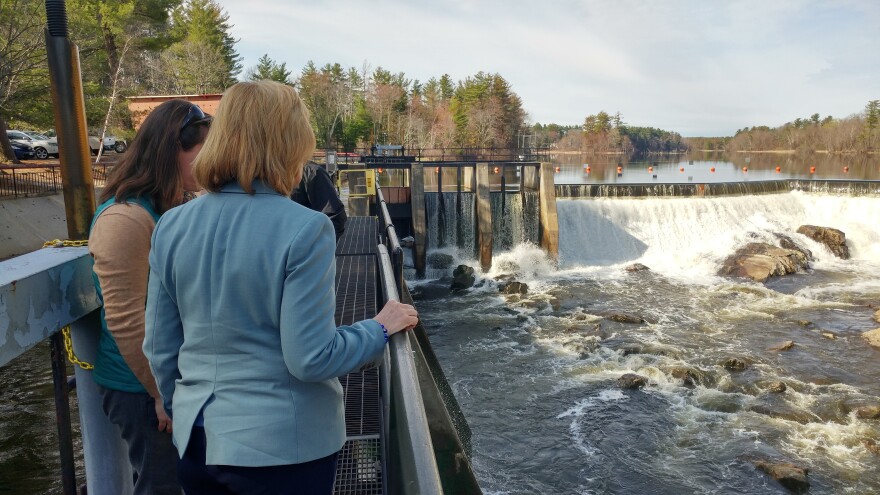Senator Maggie Hassan was in Nashua Friday to tout her proposed study on the renewable energy practice of net metering, which lets ratepayers offset their bills by selling power they generate back into the grid.
It’s commonly used for homeowners to save on energy costs with rooftop solar panels, but it’s possible with bigger customers and energy developments, too – depending on state laws.
Hassan, a Democrat, wants the National Academy of Sciences to study the issue, so states like New Hampshire can fine-tune those rules.
"We have been concerned that other work that’s been done in this space is more one-sided,” she says. “So what I’m really just trying to do is get best practices out there."
Hassan talked about the legislation while touring the Mine Falls Dam in Nashua.
The hydroelectric facility’s three-megawatt capacity makes it too big to fall under the state’s one-megawatt net metering cap for big customers.
So instead, the city sells the power to the New Hampshire Electric Co-op.
But it could earn more in net-metering rebates – and reduce its carbon footprint – by using the power to run its municipal buildings.
The New Hampshire Senate has advanced a bill to raise the cap on large-scale net metering to five megawatts. Nashua’s waterways manager, Madeline Mineau, hopes it’ll become law.

“That would help large energy users like the city or manufacturers to really look at renewable energy for an option,” she says.
“Net metering is just such a great way for them to choose how they want to get their power, and to control their costs, and invest locally in renewables and then keep locally generated power local.”
Mineau led Sen. Hassan around the dam and powerhouse, where two multi-story turbines turn falling water into electricity.
“The water comes in through the intake, goes down – you can see how far down it goes there,” Mineau says over the roar of the turbine, pointing through the grated floor. “So it goes through the turbine… and then out the back of the powerhouse into the tail race, and that’s how the power’s generated.”
Mineau says she disagrees with net-metering opponents who say it creates a subsidy for renewable energy. She says Nashua would use more flexibility from the state to save money, by investing in solar or other net-metering projects.

Hassan says she hopes her study will encourage that kind of change.
“The administration may be turning a blind eye to climate change, but at the local level we’re not,” Hassan says. “So what I’m trying to make sure is that localities, cities, states, can move forward doing renewable energy as effectively as possible.”
Her study bill is co-sponsored by Democrats in both chambers of Congress.








